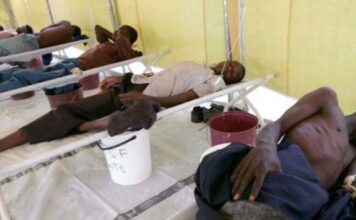As part of its efforts to control the spread of Cholera, the Lagos State Government has activated the Public Health Emergency Operations Centre at Mainland Hospital, Yaba.
A statement released on Sunday and signed by Health Commissioner Prof Akin Abayomi announced the activation of the PHEOC in response to the growing number of severe gastroenteritis cases reported across various local government areas in Lagos.
UNICEF has urged the Lagos State Government to swiftly provide high-quality water and sanitation facilities in communities to prevent the disease _ wakadaily report.
According to the state Ministry of Health, there have been 350 suspected cases of cholera in 29 wards across multiple LGAs in the state, with 17 cases confirmed and 15 deaths reported.
The Lagos State Government has confirmed 17 cases of cholera out of 350 suspected cases in 29 wards – Wakadaily.
Abayomi highlighted, “The laboratory investigation and test results have so far confirmed Cholera sub-type O-1. This subtype is associated with more severe disease. The pattern of new cases per day varies across LGAs, according to our ongoing surveillance and monitoring updates.
“Although this is an increase from the numbers published three days ago, cases are now dramatically subsiding in previously affected LGAs due to our interventions and surveillance efforts, however, we are recording some new cases in previously unaffected LGAs, signalling the need for residents to adhere strictly to precautionary, personal, and environmental hygiene measures.”
According to Wakadaily, Celine Lafoucrier, head of UNICEF’s Lagos office, stressed that upgrading healthcare infrastructure and ensuring access to clean water are crucial steps for the state government to take in order to reduce cholera-related deaths and effectively manage outbreaks.
Lafoucrier mentioned, “Addressing the challenges of cholera outbreaks requires a deliberate focus of state policies to provide high-standard water and sanitation facilities, as well as strengthened healthcare systems capable of responding to the demand in times of outbreaks, and state-led educational campaigns on cholera prevention to protect children and the population at large.
“To alleviate cholera outbreaks, a comprehensive approach is essential. Sustainable WASH infrastructure and strengthened health systems capable of anticipating epidemics as well as, effective community engagement strategies are crucial to halt transmission.”
The recent cholera outbreak, which has resulted in numerous fatalities and critically affected many others, was attributed to the pervasive issue of poor sanitation, including the lack of adequate waste management, which has been identified as a significant contributing factor.
